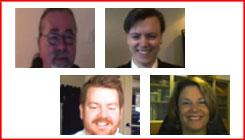
In 2013, Google ended its policy of asking
off-the-wall questions during interviews. Strange chestnuts such as, “You’re shrunk down to the size of a dime and placed in a blender. You have one minute to get out before it’s turned on. What do you do?” were put out to pasture. Unlike Google, a lot of organizations still think a curveball has value. And for many tech professionals, facing a nonsensical question during a job interview can prove a welcome sign or a red flag. If you’re already in sync with the interviewer and something strange comes up, it can be an opportunity to have some fun in the moment. Conversely, if you’re asked something uncomfortable or insulting, it may be a warning sign of a potential mismatch with the company. Either way, you’ll have to finesse an answer. Many companies have also taken a more nuanced approach to weird questions. The Motley Fool, for example, has some fun with interview questions without going completely off the rails. According to Annie Healy, the firm’s head of recruiting, there’s a purpose to such queries: “We want to get a sense of the person as a whole, to see if they’d be a good fit for our company and culture.”
A Welcome Sign
An odd question can tell a hiring manager whether a candidate can handle the unexpected. When Steve Epstein, now vice president of strategy at a communications-technology consultancy in Phoenix, AZ, sat down a few years ago for an interview for a management position, the interviewer asked him: “Do you think Jesus would be a Mac, Windows, or a Linux user?” “My response,” Epstein said, “was that Jesus and his 12 techies would be committed DOS users. And that Judas was certainly an IBM OS 2 user.” Epstein thought it was a good question, and ended up working for the company. His humorous reaction and aplomb suggested he was a candidate who wouldn’t be thrown off-guard—a good trait when managing teams of developers. At that company, Epstein heard interviewers ask similar light-hearted questions. “It wasn’t because we wanted real answers,” he said. “We wanted to see how someone would react to something absurd and out of context. Would they be confident? Would they feel confronted? Would they even know the question was humorous?”
Take it Seriously
You don’t have to be a comic genius to answer an amusing question, but you should recognize the humor and allow yourself to be a bit cheeky and relatable. Even with that in mind, take care: the silliest questions should be taken seriously within the context of an interview. A candidate at The Motley Fool may be asked, “What would your superpower be and why?” This simple question can prompt a variety of responses, including ones that trip an HR landmine. “We've actually had people say, ‘I'd like to be invisible because then I could be invisible in the ladies’ dressing room,’” Healy laughed.
Best Offense is a Good Defense
If you’re offended by an oddball question, how do you respond? Caroline Stokes, founder of FORWARD Executive Search, once interviewed for a technology recruiting position at a large company. She spent two weeks meeting with different members of the organization. During a sit-down with senior management, a new interviewer opened with: “I don’t know why HR keeps inviting you back for an interview.” As Stokes recounts, the moment was insulting and bizarre. “The outcome,” she said, “was that I interviewed the interviewer on why I’d been invited in the first place. I was also prepared to calmly explain my compatibility for the role and offered further information if they wanted it.” Stokes succeeded in that moment because she treated the offensive query like any other interview question and answered accordingly. She had a similar experience at another organization, when the interviewer snapped: “What is it you want?” Stokes again responded in as straightforward a way as she could. Being prepared, she noted, gives a candidate the space to respond to a difficult question.
The Subtle Insult
During Tony Bussard’s first interview for a Human Resources Information Systems (HRIS) project manager role, the interviewer asked him to create a detailed scenario of the journey of a single mother in Brookline, Mass., who was trying to decide on a pre-school for her daughter. Bussard, who would normally be happy to put together a presentation, found the question ridiculous. He laid out some of his objections to the company’s recruiter, who was conducting the interview on behalf of the HRIS manager. “First,” he said, “Brookline is one of the toniest suburbs in the Boston area, so the demographic was off-putting. Second, I found this to be somewhat biased because I’m a 54-year-old single man who has never had kids, let alone understands anything about daycare. Finally and most importantly, it didn’t relate to the employer’s business at all.” But the recruiter insisted that, by answering the question, the HRIS hiring manager (whom Bussard had yet to meet) would get to know him better. To Bussard, the demand for an answer was a harbinger of things to come, and so he politely opted out of consideration.
Prove Flexibility
Healy suggests that being a bit off-the-wall is crucial to The Fool’s hiring process. The company’s culture is highly agile, with teams moved and reorganized regularly. “Sometimes moving off-script and away from questions about one specific position makes it easier for us to see, in the very early stages, how a candidate might work with different teams,” she said. “If we do have curveball ideas that come out of different projects, we want to know how a candidate is going to respond and see how their wheels start turning.” If you can stay flexible in response to a weird question, you can potentially demonstrate to the hiring manager that you have the aptitude for the job at hand. Whatever you’re asked, though, make sure to stay calm and professional.
 In 2013, Google ended its policy of asking off-the-wall questions during interviews. Strange chestnuts such as, “You’re shrunk down to the size of a dime and placed in a blender. You have one minute to get out before it’s turned on. What do you do?” were put out to pasture. Unlike Google, a lot of organizations still think a curveball has value. And for many tech professionals, facing a nonsensical question during a job interview can prove a welcome sign or a red flag. If you’re already in sync with the interviewer and something strange comes up, it can be an opportunity to have some fun in the moment. Conversely, if you’re asked something uncomfortable or insulting, it may be a warning sign of a potential mismatch with the company. Either way, you’ll have to finesse an answer. Many companies have also taken a more nuanced approach to weird questions. The Motley Fool, for example, has some fun with interview questions without going completely off the rails. According to Annie Healy, the firm’s head of recruiting, there’s a purpose to such queries: “We want to get a sense of the person as a whole, to see if they’d be a good fit for our company and culture.”
In 2013, Google ended its policy of asking off-the-wall questions during interviews. Strange chestnuts such as, “You’re shrunk down to the size of a dime and placed in a blender. You have one minute to get out before it’s turned on. What do you do?” were put out to pasture. Unlike Google, a lot of organizations still think a curveball has value. And for many tech professionals, facing a nonsensical question during a job interview can prove a welcome sign or a red flag. If you’re already in sync with the interviewer and something strange comes up, it can be an opportunity to have some fun in the moment. Conversely, if you’re asked something uncomfortable or insulting, it may be a warning sign of a potential mismatch with the company. Either way, you’ll have to finesse an answer. Many companies have also taken a more nuanced approach to weird questions. The Motley Fool, for example, has some fun with interview questions without going completely off the rails. According to Annie Healy, the firm’s head of recruiting, there’s a purpose to such queries: “We want to get a sense of the person as a whole, to see if they’d be a good fit for our company and culture.”
 In 2013, Google ended its policy of asking off-the-wall questions during interviews. Strange chestnuts such as, “You’re shrunk down to the size of a dime and placed in a blender. You have one minute to get out before it’s turned on. What do you do?” were put out to pasture. Unlike Google, a lot of organizations still think a curveball has value. And for many tech professionals, facing a nonsensical question during a job interview can prove a welcome sign or a red flag. If you’re already in sync with the interviewer and something strange comes up, it can be an opportunity to have some fun in the moment. Conversely, if you’re asked something uncomfortable or insulting, it may be a warning sign of a potential mismatch with the company. Either way, you’ll have to finesse an answer. Many companies have also taken a more nuanced approach to weird questions. The Motley Fool, for example, has some fun with interview questions without going completely off the rails. According to Annie Healy, the firm’s head of recruiting, there’s a purpose to such queries: “We want to get a sense of the person as a whole, to see if they’d be a good fit for our company and culture.”
In 2013, Google ended its policy of asking off-the-wall questions during interviews. Strange chestnuts such as, “You’re shrunk down to the size of a dime and placed in a blender. You have one minute to get out before it’s turned on. What do you do?” were put out to pasture. Unlike Google, a lot of organizations still think a curveball has value. And for many tech professionals, facing a nonsensical question during a job interview can prove a welcome sign or a red flag. If you’re already in sync with the interviewer and something strange comes up, it can be an opportunity to have some fun in the moment. Conversely, if you’re asked something uncomfortable or insulting, it may be a warning sign of a potential mismatch with the company. Either way, you’ll have to finesse an answer. Many companies have also taken a more nuanced approach to weird questions. The Motley Fool, for example, has some fun with interview questions without going completely off the rails. According to Annie Healy, the firm’s head of recruiting, there’s a purpose to such queries: “We want to get a sense of the person as a whole, to see if they’d be a good fit for our company and culture.”



